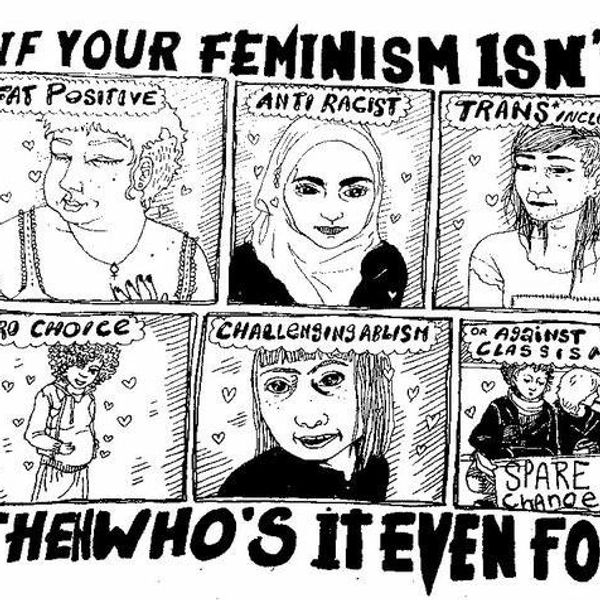In the scorching heat of a Colorado summer, I sat in my father's garage and talked about everything from school to politics to eventually my everyday encounters at our local Starbucks. I told my dad about the three times in which a stranger had waited around for me to get my drink so they could follow me after I left, including one instance in which I drove around for 20 minutes until I could pull up next to a police officer to get rid of my stalker. While giving me a look of sympathy, my dad said he was shocked at how I was treated in our small town coffee shop, but followed it up with a good-old fashioned "You do wear some pretty revealing clothes, though."
That is when it struck me. My father is not an evil man, he just simply doesn't understand. While he believes that wearing a purple v-neck and jean shorts doesn't give any man the right to sexually assault me, he is still on the fence about whether or not this outfit permits a greasy old man in a Subaru Forester to follow me.
He has adapted to a quasi-feminism that our Western society uses to mask the real issues that women face every day.
For those who don't know, or haven't listened to a Beyoncé song recently, the definition of feminism, as taken from Merriam-Webster, is, "the theory of the political, economic and social equality of the sexes."
Many millennials believe that the women's rights movement in the 20th century fixed any gender-based inequality. They believe that a right to vote and a few laws on paper solve any gender gaps that exist. American society has tricked them into having this "quasi-feminist" view. But the statistics show how shockingly untrue this is.
In 2014, legislature introduced more than 468 restrictions regarding women's health, yet Congress, the deciding body in these new prospective bills, is made up by about 18 percent women. In case you were wondering, zero restrictions were introduced for men.
Fact: One in North American four women will be sexually assaulted in her lifetime. Additionally, "30 percent of women who have been in a relationship report that they have experienced some form of physical or sexual violence by their partner." Think of four women in your life, your mom, sister, aunt and girlfriend. Maybe a daughter or a niece. Now think about how you don't identify as feminist. Now, decide which one of them you are OK with being assaulted.
If you think cancer has touched everyone you know in your life, keep in mind that, according to the UN, women around the world ages 15 to 44 are more at risk for rape and domestic violence than for cancer, car accidents, war and malaria.
These statistics do not even touch on international discrimination, such as India's recent ruling that rape does not exist when a man and woman are married, and that child marriage is still very common in the Middle East, with girls as young as seven being married off to men.
For the quasi-feminists out there, I envy you. For those who can turn a blind eye to the violence that happens in America, and the disturbing genital mutilation, mass killings and dehumanizing of women that happens all around the world -- I truly envy you.
But I cannot plead ignorance, because every time I go to a party and a drunk boy grabs me and doesn't let go; every time a boy gets a higher grade and more praise than me in class; every time I walk hand-in-hand with my boyfriend while another man catcalls me and smiles like I am a shiny object he is going to get his paws on, I think about how we are nowhere near political, economic or social equality.
Every time I get a tall cinnamon dolce latte and croissant, I think of my dad, and the millions of others just like him, and how he has been fooled into turning a blind eye to the fact that I will likely be sexually assaulted in my lifetime. And how they become hardened to the notion that this is not in any way equality.
And every time I take a sip of my hot drink, I am reminded of the quasi feminists out there who decide to stay in their comfortable utopia of hidden gender inequality, rather than save me.





















